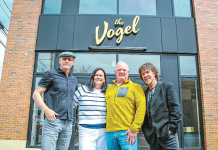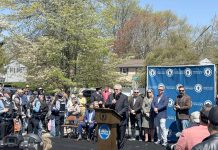
By Judy O’Gorman Alvarez
The 2020 holiday season has a different look. Forget the Santas without kids on their laps, malls without crowds and holiday parties sans mistletoe meet-ups. Imagine a rendition of “Silent Night” that is, well, almost silent.
During nine months of pivoting, adapting and praying for grace, houses of worships and their clergy have worked to keep their congregations physically safe and spiritually filled during the COVID-19 pandemic. Now with the joyous Christmas and Hanukkah season upon us, they are continuing to welcome worshipers while tweaking the usual celebrations.
“Everybody is so fatigued from the long COVID season and the church is not immune to it,” said Rev. John Mason Lock, rector, Trinity Episcopalian Church in Red Bank. “We’re all trying to push through to the end.”
Abiding by the Episcopalian Diocese, the small church on Front Street welcomes 50 people or one quarter of its capacity, even fewer than state guidelines allow.
Like many houses of worship, Trinity started virtual Sunday services – which they continue to do – adding limited capacity indoors when the state rules allowed. “For a long time, we were fully virtually, which is not altogether satisfying.”
But Lock notes many parishioners continue to be concerned about any in-person gatherings, which is understandable. For Christmas, as well as Sunday services, reservations must be made ahead of time, necessary to adhere to guidelines and for contact tracing. “We also allow for walk-ins,” he said.
“Should we get to the cap of physical attendees, we’ll have volunteers from leadership that would choose to leave the building so visitors can come in and experience God’s love.”
Lock said they’re trying to keep to the holiday schedule: two services on Christmas Eve and one Christmas Day Mass, as well as one service at the Atrium, where a number of parishioners live and the church has had a longstanding pastoral relationship.
And although congregants are masked and distanced during Sunday services, they’re still not allowed to sing.
“Singing,” Lock said, “is a very tangible thing we’re missing right now.”
Sometimes worshipers spontaneously burst into hymns while the organist plays, but they are good-naturedly shushed.
“Singing produces more droplets,” Lock said. “And we sing like Protestants. Especially on Christmas.”
Lock said they are thinking about informal caroling after Christmas services outside the church when worshipers can bellow “O Little Down of Bethlehem” and other joyful hymns in the December air.
“We’ll have to do something to satisfy that desire.”
As with all businesses and organizations, houses of worship need to be flexible. Plans could change and Christmas may be celebrated virtually only, depending on infection numbers and coronavirus state guidelines, diocesan mandates and the rector’s decision.
“If we’re putting our health care workers in danger, then we may make that decision,” Lock said. “But right now, we’re holding steady.”
Clergy and congregants at Congregation B’nai Israel (CBI) in Rumson understand flexibility during this pandemic, too.
“All of us were hoping that by this time, life would have returned to a semblance of normality and obviously the opposite has happened,” said Rabbi Douglas Sagal.
Since the pandemic, CBI has used Zoom for worship services. “We’ve done a few outside gatherings that have been socially distanced, and continued socially distanced funerals,” he said. “But essentially what’s really changed is the fact that we cannot worship typically together in the sanctuary. And it’s really difficult to visit each other’s homes.”
As a result, the synagogue is creating different projects and events, leaning heavily on online platforms. “We try to do things to bring the community together even if we’re physically distanced,” he said.
At Thanksgiving, they delivered a gift basket to every synagogue member. “We’re trying to find ways to maintain connection even when we can’t be physically together.”
They’ve had to cancel the outdoor scavenger hunt as part of their Dec. 13 Chanukah Celebration, but instead created a Zoom celebration.
From the safety of their homes, congregants can participate in a sing-along, light the family chanukiyah – or menorah – and even look for treasures in a scavenger hunt. “It’ll be creative,” said Sagal.
“Ironically even though we’re separate, this is the time we need our community more than ever,” Sagal said. “The role of the synagogue or church or mosque is even more important because we can be the focal points for a community that is feeling increasingly isolated. We have the mission and the goal to bring them together.”
Decisions on worship in Roman Catholic churches depend on state and diocesan guidelines, as well as the physical layout of the church, according to Rev. Jim Grogan, pastor of Church of the Nativity in Fair Haven.
Current guidelines allow occupancy of 150 people; Christmas Masses at Nativity will allow 100 people each in the church’s two spaces: the upper church and the lower parish hall. As with most holiday celebrations this year, worshipers must reserve and secure general admission tickets. This Christmas the church added an additional Mass to make a total of seven between Christmas Eve and Christmas Day.
As usual, there will be music – and singing – at the Masses, just as they have had all along. But it’s restricted to one cantor and one musician, positioned a distance apart from each other and in the choir loft, a good distance from the congregation.
Other adjustments the church has made include removing prayer books, as paper is difficult to sanitize; mask wearing for all, when not in the act of celebrating Mass; and having eucharist ministers sanitize their hands before distributing communion. “We realize it’s important for people to see them doing that,” Grogan said.
Despite the adjustments, Grogan said some changes have turned out to be welcomed. He cites the livestreaming technology that has allowed people with underlying conditions or those not comfortable leaving their homes to participate in Mass.
“We’ve had to cancel Advent events that would’ve been interactive,” such as breakfast with St. Nicholas, because of the pandemic. So, realizing that families with young children may be missing out on visits with Santa, Grogan said, “We created an outside opportunity to celebrate and keep St. Nicholas in the picture.”
“The pandemic is a catastrophic event, a crisis for the world we’ve been living in for more than half a year,” said Grogan. “But there is no time like the present to pray. To ask God to provide safety, relief, to guide us forward at this tumultuous time.”
“The pandemic did not cancel Christmas. It changed it,” he said. “And in those changes, we will likely find some wonderful things.”
The article originally appeared in the December 10 – 16, 2020 print edition of The Two River Times.














